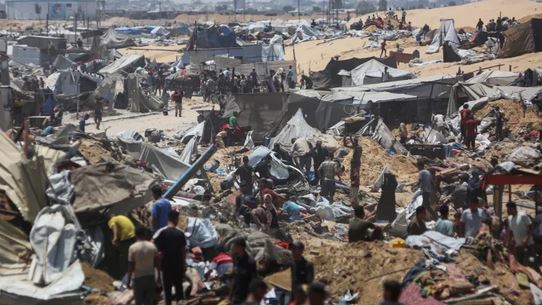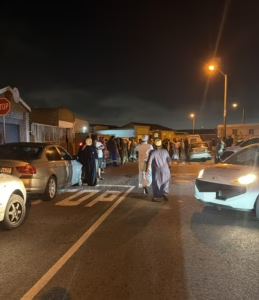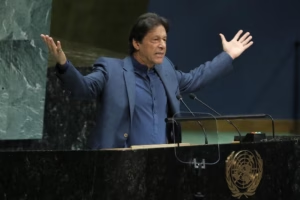Egypt has issued a firm rejection of Israel’s contentious plan to establish a so-called “humanitarian city” in southern Gaza’s Rafah area, describing the move as a threat to regional security and an attempt at forced displacement. The initiative, which has triggered condemnation from Arab governments and civil society alike, would see the construction of a gated camp intended to hold hundreds of thousands of Palestinians indefinitely, with no return to their homes in northern Gaza permitted.
In a recent phone call with United States Middle East Envoy Steven Witkoff, Egypt’s newly appointed Foreign Minister, Badr Abdelatty, made clear Cairo’s opposition to the Israeli proposal. The concerns, deeply rooted in both political calculations and public sentiment, reflect fears of a new humanitarian crisis spilling over into Egyptian territory.
Public Resistance: “This Is Their Land”
The resistance to the proposal is not limited to the halls of government. On the streets of Egypt, citizens have been vocal in their rejection of what many perceive as an attempt to erase Palestinian claims to their homeland.
“The Arab position is unified, and Egypt’s position has been consistent from the beginning of the Palestinian issue. Our opinion is consistent, and the opinion of the Egyptian people is consistent, and the political leadership in Egypt is consistent: there is no displacement, no playing around with the Palestinian issue, no evacuating the land, and no displacement in any way, shape or form,”
said Ahmed Hassan, an Egyptian resident.
This sentiment was echoed by others, who viewed the Israeli plan as morally and politically indefensible.
“This is their land. There is no way they will abandon it and leave. Anyone in their place would not leave their home or accept that someone else push them out of it,”
said Karam Al-Abassi, another Egyptian citizen.
“This land belongs to Palestine, so it’s not right for anyone to come and control someone else’s land as he pleases. You understand what I mean? No, this land has had its name here in Palestine since ancient times, a very long time ago. Its name is Palestine. This is their land. It’s not right for anyone to come and seize it all at once and take advantage of the fact that they don’t have an army or a police force or anything,”
explained Mohamed Hani, also from Egypt.
Arab League Decries Alleged “Ethnic Cleansing”
The Arab League has also criticised the proposed encampment, warning that it is not grounded in any genuine humanitarian concern. Instead, the pan-Arab organisation views the plan as part of a broader strategy to forcibly displace Palestinians and undermine their historical and political claims to Gaza.
“Israel does not know humanity. Even in distributing aid with the United States, it was a trap for some of our brothers in Palestine. Today we are talking about a real tragedy that the international community has unfortunately overlooked,”
said Mohamed Al-Sherif, the director of the Al-Araby Center for Research and Studies.
The league’s statement aligns with growing concern that the camp could be a veiled attempt at demographic engineering. Such a move, according to critics, would not only expel Palestinians from their homes but could also reduce the pressure on Israel to negotiate a lasting peace deal based on mutual recognition and borders.
Strategic Risks and Treaty Violations
Egypt’s anxieties are compounded by the strategic implications of Israel’s plan. Should the camp in Rafah be erected, Egyptian officials fear it could incite a surge of refugees toward Egypt’s border, burdening an already strained infrastructure and potentially escalating tensions in the Sinai Peninsula. The situation would also risk violating the terms of the 1979 Egypt–Israel peace treaty, which limits military deployments near the border.
“The more the circle of war expands, the more unsafe it becomes for Israel. We have seen how the circle of war with the Iranian side has expanded, and how Israel’s security has been directly targeted. We are talking about losses faced by the occupying entity which have not occurred since the October 1973 victory. Of course, the liquidation of the Palestinian cause will not achieve security for Israel,”
warned Al-Sherif, highlighting the broader geopolitical dangers of intensifying conflict.
Domestic Tensions Inside Israel and Global Backlash
Even within Israel, the proposed settlement plan has sparked division. Analysts suggest the financial burden of maintaining such a large-scale encampment could further strain Israel’s economy, while the ethical implications risk alienating key international allies.
Some Jewish communities in Europe and North America have raised concerns that the optics of the camp could fuel antisemitism abroad. These communities fear that comparisons to historical atrocities, such as concentration camps, may gain traction and shift global opinion further against Israel’s handling of the Gaza crisis.

















